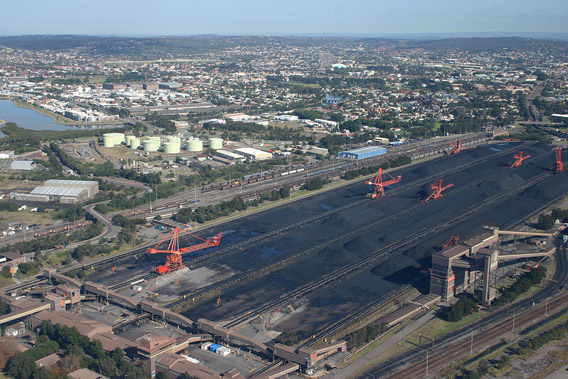
Coal Stacker – Newcastle Australia. The world’s largest coal port. Photo by: Bigstock.
An Australian court last week ruled that climate change was not reason enough to halt the $6.3 billion Wandoan coal mine in Australia in a landmark case. Swiss coal mining company Xstrata succeeded in defeating a challenge from the environmental NGO Friends of the Earth and local farmers, which argued that the mine should be halted due to its resulting carbon emissions.
“It is difficult to see from the evidence that this project will cause any relevant impact on the environment,” Carmel MacDonald head of the Land Court of Queensland ruled. The court cited arguments by Xstrata that if the company did not exploit the coal at the Wandoan mine, coal would be exploited elsewhere to fill global demand.
The court further argued that the economic benefits of exploiting the coal field outweighed environmental harm. Total greenhouse gas emissions of the Wandoan coal mine could eventually equal 0.17 percent of the world’s total emissions. The Wandoan mine will begin by producing 23 million tons a year and moving up to 63 million tons. Xstrata recently signed a deal with Japan to supply the country with coal.
Australia is the world’s largest exporter of coal, sending over half the coal mined in the country abroad.
Coal is the world’s most carbon intensive fuel. A recent study found that if the world’s coal reserves are burnt it would raise global temperatures by 14.8 degrees Celsius (26.6 degrees Fahrenheit), essentially leading to a climate doomsday scenario. To date, global temperatures have risen about 0.8 degrees Celsius (1.44 degrees Fahrenheit) since the beginning of the 1900s.
Related articles
IEA warns: five years to slash emissions or face dangerous climate change
(11/13/2011) Not known for alarmism and sometimes criticized for being too optimistic, the International Energy Agency (IEA) has warned that without bold action in the next five years the world will lock itself into high-emissions energy sources that will push climate change beyond the 2 degrees Celsius considered relatively ‘safe’ by many scientists and officials.
India targets forests for destruction, industrial development

(02/28/2012) In a bid to fast-track industrial projects, India’s Prime Minister’s Office (PMO) is opening up 25 percent of forests that were previously listed as “no-go” areas, reports the Hindustan Times. The designation will allow between 30 and 50 new industrial projects to go ahead rapidly, including road construction and coal mining. Reportedly the changes came after industry representatives met with the Prime Minister’s Office, headed by Manmohan Singh, to complain that projects were being held up by environmental regulations, in some cases taking six years for approval.
Interactive map reveals the human cost of mountaintop mining
(02/21/2012) Environmental degradation can have major impacts on a community’s quality of life and a new interactive map of mountain top mining for coal in the U.S. makes this abundantly clear: based on 21 scientific studies, the map highlights how communities near mountain top mining have lower life expectancy, higher birth defects, worsening poverty, and are more likely to suffer from cancer, as well as heart and respiratory disease. Created by the non-profit Appalachian Voices and posted on ilovemountains.org, the map show that most communities near mountain top removal sites are in the bottom 1 percent for overall well-bring in the U.S.
One company behind U.S.’s top three biggest greenhouse gas emitters
(01/16/2012) The Atlanta-based Southern company owns the top three biggest sources of greenhouse gas emissions in the U.S. according to recent data released by the Environmental Protection Agency (EPA). Three of Southern’s coal-fired plants—two in Georgia and one in Alabama—account for around 64.74 million metric tons of total greenhouse gas emissions, higher than all of Finland’s carbon emission in 2008.
Media campaign says mercury pollution a pro-life issue
(12/14/2011) While pro-life activists usually target abortion, a new campaign is working to broaden the pro-life message. A $250,000 media campaign in the U.S., including TV spots and radio ads in eight states, hopes to pressure conservative senators to protect unborn children by supporting the Environmental Protection Agency’s (EPA) regulations on mercury emissions from coal-fired plants.
Direct air capture of CO2 to fight global warming is too expensive to be feasible
(12/09/2011) Using existing technology to ‘scrub’ carbon dioxide directly from the atmosphere is far costlier than capturing emissions directly from the smokestacks of coal-burning power plants, reports a paper published this week in the Proceedings of the National Academy of Sciences.
Top 20 banks that finance big coal
(11/30/2011) A new report from civil and environmental organizations highlights the top 20 banks that spend the most money on coal, the world’s most carbon-intensive fossil fuel. Released as officials from around the world meet for the 17th UN Summit on Climate Change in Durban, South Africa, the report investigated the funding practices of 93 major private banks, finding that the top five funders of big coal are (in order): JPMorgan Chase, Citi, Bank of America, Morgan Stanley, and Barclay’s.














